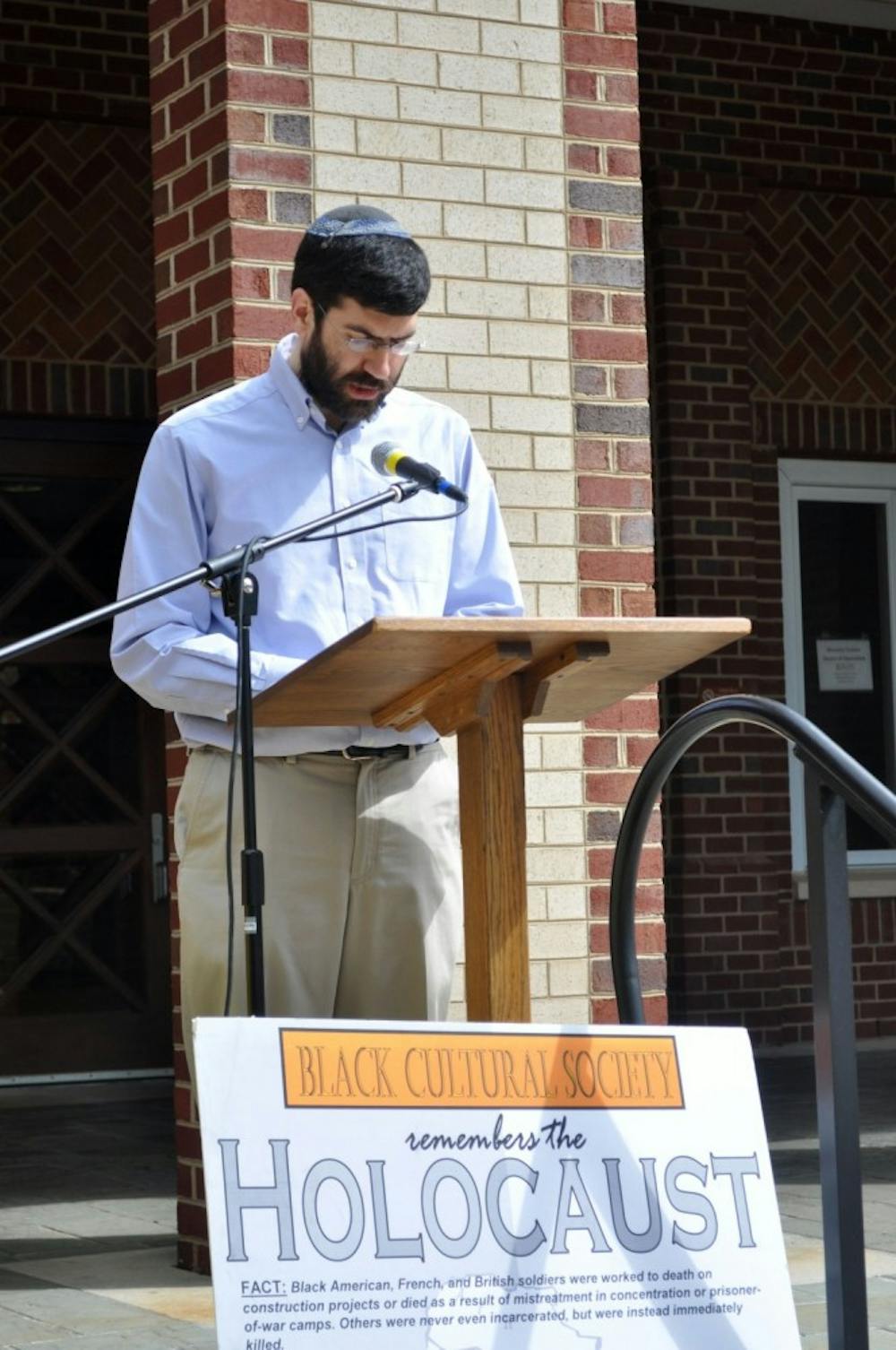The reading of the names of Holocaust victims revealed a connection to the past, according to Phil Smith, associate chaplain and director of Religious Life at Elon University. While students, faculty and staff read the names aloud outside Moseley April 19 during the internationally recognized day for Holocaust Remembrance, many others walked past and continued with their normal business. Some of the students who did notice only stopped and listened to the names for a minute or two.
For Smith, the scene recalled past behavior of the majority that ignored what was happening around them. Other community members found a connection between the reading of the names and the future.
“In Jewish tradition, there’s a power that comes with names,” said Nancy Luberoff, Hillel campus director. “Keeping these names alive is a very powerful and symbolic way of keeping their memories alive, especially because for many of the victims of the Holocaust, their family line ended with them, and so their names are not being continued.”
The reading of the names was part of a series of events Elon Hillel organized in honor of Holocaust Remembrance Week, which took place April 15-22. The week began at College Coffee, where members of the organization distributed ribbons commemorating the different groups persecuted during the Holocaust. Events in memoriam of the Holocaust also included a speech from a Holocaust survivor, a film, “The Last Survivor,” which chronicles the stories of four survivors from four different genocides and a dinner discussion with Yoram Lubling, a professor of philosophy and child of two Holocaust survivors.
“This is not meant to be a week of horror and tragedy,” Luberoff said. “It’s meant to be a week of remembering and hope for the future. You have to understand what happened in order to prevent it from happening again.”
Yet members of the Jewish community are not the only ones intent on remembering. While Hillel organized the events, numerous organizations on campus identify with other groups that experienced persecution during the Holocaust. Several members of Spectrum participated in the reading of the names that honored the victims of the historic tragedy.
Understanding the historic event involves recognizing connections between one’s self and those involved in the Holocaust, including both the vicitim and the aggressor, according to Kirstin Ringelberg, coordinator of the LGBTQ office and co-adviser of Spectrum.
“I think it’s important for all of us at Elon to recognize the way that our own identities intersect with those that were involved (in the) Holocaust, both from the (side of the aggressor) and from the victim side,” Ringelberg said. “I think that more thinking about the Holocaust not as a Jewish experience but as a human experience that we’ve all taken part in in some way would be an important shift that we could make as a campus community, to think more about the intersections of our identities and how they’re always in some way connected to events like those."
Though Ringelberg acknowledges a connection between the LGBTQ community and the Holocaust, the remembrance week coincided with Pride Week, which celebrates the LGBTQ movement, preventing the two organizations from working as closely as they could have, she said.
Senior Jess McDonald, former president of Spectrum, said she hopes Hillel and Spectrum will collaborate better next year to support each other during their respective commemorative and celebrative weeks.
The director of the Multicultural Center, Leon Williams, also recognizes a connection between the Multicultural Center and the week of remembrance. Williams said that though members of the center did not participate in Holocaust Remembrance Week in a deliberate way this year, the office will focus on religious diversity during the 2012-2013 academic year. Remembering the Holocaust is important because the experiences of African Americans who were enslaved and Jewish people during the Holocaust are similar, he said. The cultures of Jewish people and African Americans on the whole have both been strongly affected by these experiences.
Freshman Maia Szulik, who founded a Holocaust awareness fund when she was 13 years old, sponsored the showing of “The Last Survivor.”
Szulik said she started the fund to tell the stories of those involved with and affected by the Holocaust. Though some people may believe remembering the Holocaust is a duty, Szulik said she feels it’s something she wants to do instead of something she has to do. She said the responsibility of preserving the memory of the Holocaust belongs not just to her, but to everyone.
“We all need to learn the stories and make sure that history doesn’t repeat itself,” she said.


